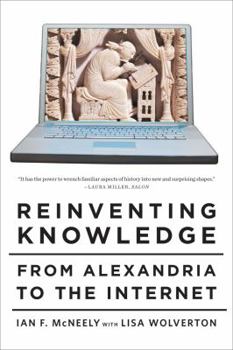Reinventing Knowledge: From Alexandria to the Internet
Select Format
Select Condition 
Book Overview
Here is an intellectual extravaganza, a dazzling history of the key institutions that have shaped and channeled knowledge in the West from the classical period to the present. Fashioned with elegance and wit, this exhilarating survey carries us through the pivotal points of institutional change and cultural transformation. It is full of memorable characters, from the flamboyant founder of the great library at Alexandria and the arrogant medieval logician...
Format:Paperback
Language:English
ISBN:0393337715
ISBN13:9780393337716
Release Date:September 2009
Publisher:W. W. Norton & Company
Length:344 Pages
Weight:0.65 lbs.
Dimensions:0.9" x 5.4" x 8.4"
Customer Reviews
2 ratings
A wonderful, fully absorbing, history book that completely and satisfactorily answers the question t
Published by Thriftbooks.com User , 14 years ago
Reinventing Knowledge: From Alexandria to the Internet Review by Richard L. Weaver II, Ph.D. In this delightful, well-written, and fully documented 276-page (of text) book, with 25 pages of notes, you will discover a wonderful, fully absorbing, history book that, in my mind, completely and satisfactorily answers the question the authors set out to answer: How does history help us understand the vast changes we are now experiencing in the landscape of knowledge? Further, what are the pivotal points of institutional change and cultural transformation from the classical period to the present? With Reinventing Knowledge you must enjoy an intellectual challenge, it is true, but if you are interested in the key institutions (i.e., the library, the monastery, the university, the republic of letters, the disciplines, and the laboratory) that have shaped and channeled knowledge in the West, this is certainly a book that will both dazzle and exhilarate your senses. Because of my background in speech communication, I was particularly drawn to the early section in which they explain the public arenas of democratic Athens where competitive speech and writing took center stage, but were considered an inferior path to truth. There was, then, a shift to knowledge as written then, in another shift, to libraries that could produce Homer's epics as well as the Greek translation of the Hebrew Bible -- which made knowledge portable. In yet another shift, monasteries arose as key knowledge institutions to not just preserve written culture of the ancient past but create new frameworks for understanding as well. It was with the creation of universities that knowledge was again embraced and there was an emphasis on performance, use of the spoken word, and the questioning of texts. This is how the authors proceed through the book, and it makes for fascinating reading.
Internet is NOT a Great Leap Forward in Reinventing Knowledge
Published by Thriftbooks.com User , 16 years ago
Edit of 29 August 2008: Am adding a couple of images to help clarify the importance of actually understanding new ways of creating, sharing, and leveraging knowledge. YES, the Internet has led to an order of magnitude or more knowledge creation and sharing but NO, it has not led to a dramatic change in the definition of knowledge or the role played by knowledge. With a tip of the hat to SALON and book reviewer Laura Miller, whose review can be found at the URL in the comment, I want to add this book to those I recommend for the growing body of citizens who are truly skeptical of the Internet as a panacea, and suspicious of Google and other "snake oil" vendors. Use the "see inside the book" feature just under the book cover above to examine details provided by the publisher. Bottom line: we are entering a period when the "wealth of networks" may reinvent knowledge, but having read and reviewed The Necessary Revolution: How Individuals And Organizations Are Working Together to Create a Sustainable World only to be stunned at the end with its discussion of how many non-human primates are learning 500-1000 human words in sign language, I am now convinced, from a system of systems perspective, that the next big leap in reinventing knowledge will be not the emergence of smart mobs, armies of davids, the power of us, but rather, when Pierre Tielhard de Chardin's noosphere becomes a reality, and all living things have co-equal standing "in communion" with one another. The nicest thing I can say about this book, other than to recommend it, is to link to other books that support the thesis the book presents: the Internet is NOT the big leap forward. See also: In the Absence of the Sacred: The Failure of Technology and the Survival of the Indian Nations Silicon Snake Oil: Second Thoughts on the Information Highway The Future of the Internet--And How to Stop It The Age of Missing Information Society's Breakthrough!: Releasing Essential Wisdom and Virtue in All the People The Wealth of Networks: How Social Production Transforms Markets and Freedom The Biodiversity Crisis: Losing What Counts (American Museum of Natural History Books) The First Idea: How Symbols, Language, And Intelligence Evolved From Our Primate Ancestors To Modern Humans






